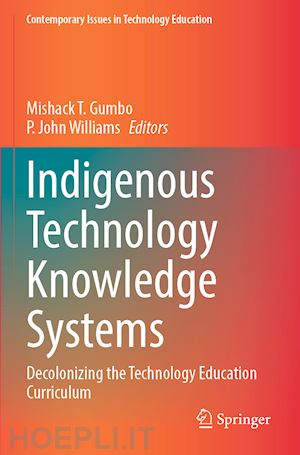

Questo prodotto usufruisce delle SPEDIZIONI GRATIS
selezionando l'opzione Corriere Veloce in fase di ordine.
Pagabile anche con Carta della cultura giovani e del merito, 18App Bonus Cultura e Carta del Docente
There has been a growing interest in indigenous knowledge systems and research. This interest has been mainly triggered by the need to decolonize education as a response to the colonial onslaught on indigenous knowledge and people. Research has, however, concentrated on the generality of the indigenous knowledge system rather than on its related dimensions. One area that has suffered a lack of attention is indigenous conceptions of science, technology, engineering, and mathematics (STEM) despite the unquestionable evidence of STEM in indigenous contexts. Most STEM is presented by colonial establishments and representations, especially in developed/modern/urban contexts, which portray STEM as a colonial construct.
This book focuses on indigenous technological knowledge systems education (ITKSE). Indigenous people have been at the front of technological developments from pre-colonial times. The list of precolonial industries, science, and technology is extensive, including blacksmithing, wood-carving, textile-weaving and dyeing, leather works, beadworks, pottery making, architecture, agricultural breeding, metal-working, salt production, gold-smithing, copper-smithing, leather-crafting, soap-making, bronze-casting, canoe-building, brewing, glass-making, and agriculture, for example. In some parts of the world such as Africa and Australia, these technologies still exist. ITKSE should not be left to exist outside of the technology education curriculum and classroom as it can benefit both indigenous students, who have been denied learning about what is relevant to them, and non-indigenous students. These cultural groups can expand their knowledge of technology by learning both ITKSE and Western technological knowledge systems education (WTKSE). ITKSE also presents opportunities for technology teachers to reflect on and revisit their depth of technological knowledge, pedagogies, and assessment.
The intent of this bookis transformational in the sense that it brings decolonial and indigenous perspectives into the technology education context. It extends technology education in the sense that it will not only influence Western-minded architects, artisans, designers, etc. but encourage indigenous-mindedness as well.
Professor Mishack T Gumbo is a Professor of Indigenous Technology Knowledge Systems Education (ITKSE) in the Department of Science and Technology Education, College of Education, at the University of South Africa. He has 26 years of university teaching experience. He is a National Research Foundation (NRF) C1-rated Researcher. He has supervised 29 doctoral and master’s students to completion. He was the Master’s and Doctoral Program Coordinator in the College of Education between 2010 and 2021. He regularly presents at seminars at UNISA, other universities in South Africa, and national and international conferences. He is a Member of four professional associations and was Senator at UNISA from 2019 to 2021. He was a Member of the International Representative and Board Member of the International Technology and Engineering Educators Association from 2013 to 2016. He is Editor-in-Chief of Indilinga: African Journal of Indigenous Knowledge Systems, and Editorial Board Member of four professional journals. Mishack has authored or co-authored over 150 publications. He is an awardee of the Prestigious External Research Award Recognition, Special Recognition for Academic in Faculty, NRF Rating Award, Comprehensive Programme for Rated Researchers, and Chancellor’s Award for Excellence in Research.
P John Williams is a Professor of Education and the Director of Graduate Research in the School of Education at Curtin University in Perth, Western Australia, where he teaches and supervises research students in STEM and technology education. Apart from Australia, he has worked and studied in a number of African and Indian Ocean countries and in New Zealand and the United States. His current research interests include STEM, mentoring beginning teachers, PCK and electronic assessment of performance. He regularly presents at international and national conferences, consults on Technology Education in a number of countries, and is alongstanding member of eight professional associations. He is the editor of the Springer Contemporary Issues in Technology Education book series and is on the editorial board of six professional journals. He has authored or contributed to over 250 publications, and is elected to the International Technology and Engineering Education Association’s Academy of Fellows for prominence in the profession.











Il sito utilizza cookie ed altri strumenti di tracciamento che raccolgono informazioni dal dispositivo dell’utente. Oltre ai cookie tecnici ed analitici aggregati, strettamente necessari per il funzionamento di questo sito web, previo consenso dell’utente possono essere installati cookie di profilazione e marketing e cookie dei social media. Cliccando su “Accetto tutti i cookie” saranno attivate tutte le categorie di cookie. Per accettare solo deterninate categorie di cookie, cliccare invece su “Impostazioni cookie”. Chiudendo il banner o continuando a navigare saranno installati solo cookie tecnici. Per maggiori dettagli, consultare la Cookie Policy.